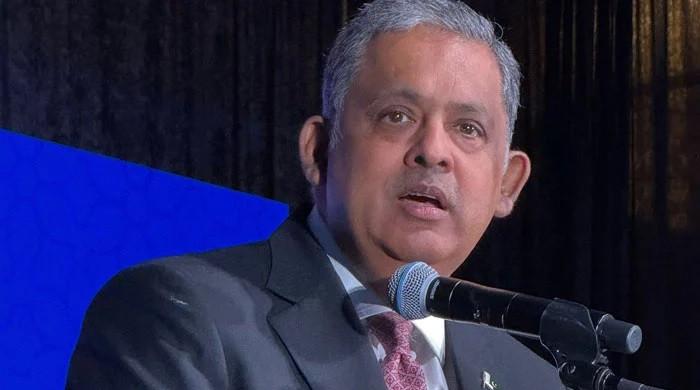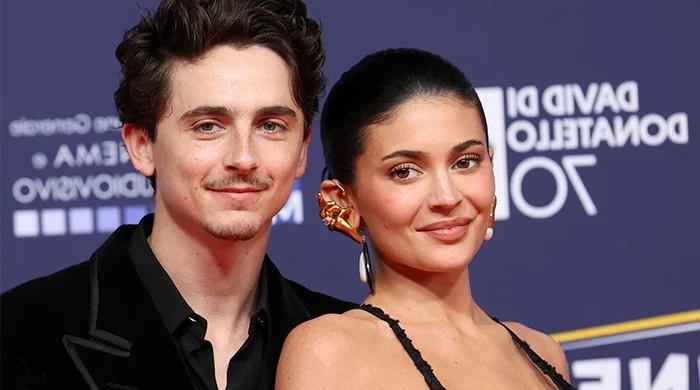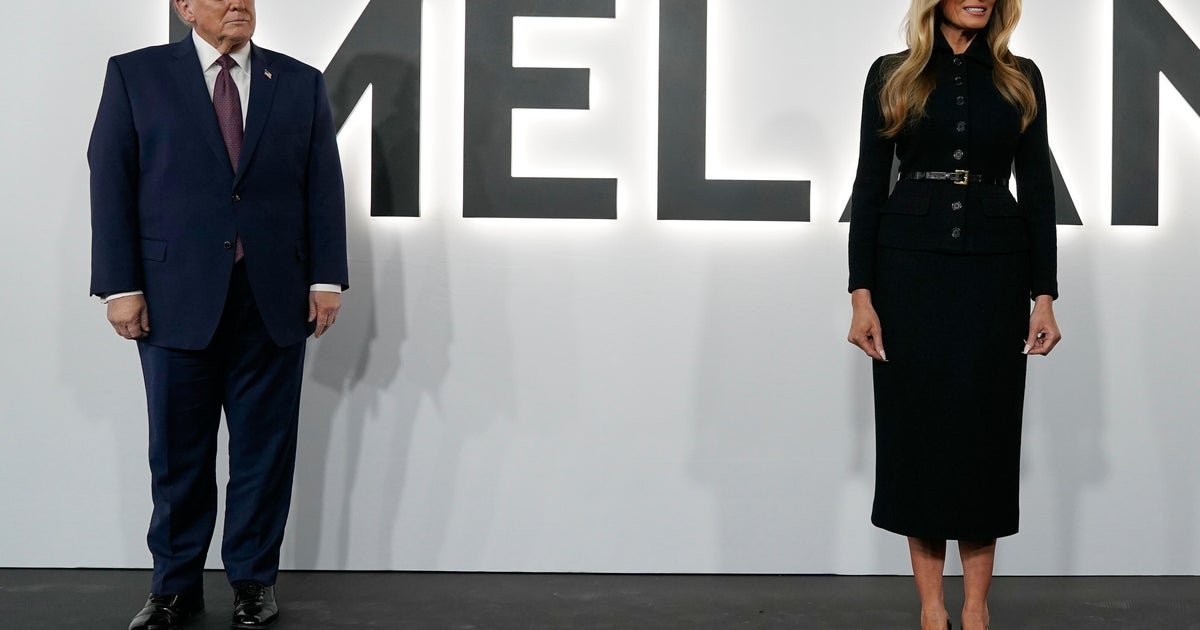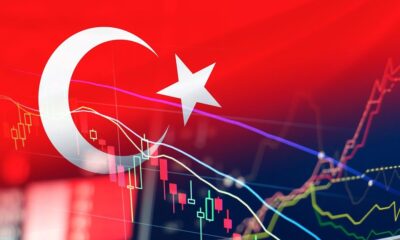Entertainment
Pakistan advancing diplomatic engagement, realistic economic agenda: ambassador

- Thanks Trump for ending 88-hour standoff, calling it a ‘vital act.’
- Urges UN-backed Kashmir issue mediation for regional peace.
- Says only undocumented Afghan refugees being repatriated.
WASHINGTON, DC: Pakistan’s Ambassador to the United States, Rizwan Saeed Sheikh, has reaffirmed Islamabad’s commitment to diplomacy, stability, and pragmatic economic policies, calling the Pakistan-US partnership “vital” to peace and progress.
“Between the two mega countries of today and tomorrow – from both a present and a futuristic perspective – good relations are not a matter of choice or preference; they are indispensable,” Ambassador Sheikh stated during a panel discussion on “The Future of the US-Pakistan Relationship” at the Future Security Forum 2025 in Washington, DC.
Highlighting the depth and continuity of the bilateral partnership, Ambassador Sheikh noted that Pakistan and the United States shared a longstanding and consequential relationship, marked by collaboration on critical global challenges, including counterterrorism and climate change.
The 11th Annual Future Security Forum was organised by Arizona State University and New America in collaboration with Security & Defence PLuS. The event brought together senior policymakers, defence experts, and thought leaders for discussions on emerging global security dynamics.
He thanked the US leadership, particularly President Trump, for facilitating the ceasefire that ended the 88-hour standoff, calling it “a vital act that prevented escalation in a nuclear neighbourhood of 1.7 billion people.”
Addressing a wide range of issues, including climate change, India-Pakistan relations, the situation in Indian Illegally Occupied Jammu and Kashmir (IIOJK), China-Pakistan relations, the Ukraine conflict, and regional tensions with Afghanistan, Ambassador Sheikh reaffirmed Pakistan’s commitment to diplomacy, stability, and pragmatic policymaking.
He spoke at length about Pakistan’s climate resilience and self-reliance. He said that climate change was not an abstract concept for Pakistan but an existential crisis.
The ambassador recounted the country’s repeated cycles of devastating floods, describing new phenomena such as cloudbursts and compounding, sequential climate disasters that have destroyed infrastructure, reversed economic gains, and disrupted development programmes.
Sheikh emphasised that Pakistan’s diplomacy today was deeply intertwined with climate policy and economic security, noting that “what we build every few years is washed away by floods, but we still must pay back what we borrowed to rebuild.”
Reiterating Pakistan’s principled stance on IIOJK, he called for international mediation to help the Kashmiri people realise their right to self-determination in line with UN Security Council (UNSC) resolutions, emphasising that peace in South Asia remains contingent upon the resolution of this longstanding dispute.
Rejecting “camp politics,” he said Pakistan’s foreign policy seeks balanced relations. He asserted that Pakistan’s ties with Beijing were rooted in historical continuity and economic cooperation.
“There is no binary choice for us. Our relationship with China didn’t start yesterday, and it is not ending tomorrow,” he remarked, adding that the China-Pakistan Economic Corridor (CPEC) should be viewed through an economic lens, as a facilitator of regional connectivity and prosperity.
He recalled Pakistan’s pivotal role in fostering rapprochement between the United States and China decades ago and expressed readiness to play a similar role today as an economic bridge for global peace and progress.
Condemning cross-border terrorism from Afghanistan, Ambassador Sheikh stated that Pakistan has endured immense suffering from terrorism and will address it resolutely.
However, he reaffirmed that diplomacy remained Pakistan’s preferred approach to resolving bilateral issues with both Afghanistan and India.
“Diplomacy is our preference. Pakistan’s history shows we have always stood for diplomatic solutions,” reaffirmed the ambassador.
On the issue of Afghan refugees, Ambassador Sheikh clarified that only undocumented or illegal residents were being repatriated and that Pakistan wanted to ensure their return in a dignified manner.
Movement across the Pak-Afghan border ought to be visa-based as per the international practice, he continued.
Regarding the ongoing Ukraine conflict, he acknowledged and welcomed peace efforts led by the United States under President Trump’s leadership, expressing hope for their success.
Ambassador Sheikh concluded by thanking the organisers of the Forum and engaging with the audience in a constructive question-and-answer session, underscoring Pakistan’s enduring commitment to global peace, dialogue, and mutual respect in international relations.
Entertainment
Timothee Chalamet reveals plans about marrying Kylie Jenner

Timothée Chalamet has offered a rare glimpse into his thoughts on marriage while addressing his relationship with girlfriend Kylie Jenner, and his response quickly caught fans’ attention.
During a recent fan interaction captured in footage shared on Sunday, Feb. 1, the actor was first asked if he currently has a girlfriend.
Chalamet answered plainly, “Yes.”
When the question turned more personal and he was asked whether he sees marriage in his future, the 30-year-old appeared momentarily taken aback before replying, “Wow. That’s so personal. You’re gonna get me in trouble, man. Yes.”
The exchange drew laughs and cheers from the crowd.
When the interviewer jokingly asked if everyone could attend the wedding, Chalamet played along, asking, “Who is we? The whole crowd?” before the interviewer suggested it might be safer to say no.
Chalamet and Jenner, 28, have been together since early 2023 and have largely kept their relationship private.
In recent months, however, the couple has been more visible, stepping out together at major events.
In December 2025, they appeared side by side in matching orange leather looks at the premiere of Chalamet’s film Marty Supreme.
Their joint appearances continued into awards season.
The couple attended both the Critics Choice Awards and the Golden Globe Awards together, where Chalamet won Best Actor for his performance in Marty Supreme.
During his Critics Choice acceptance speech, he publicly acknowledged Jenner, saying, “Thank you to my partner of three years. Thank you for our foundation. I love you. I couldn’t do this without you. Thank you from the bottom of my heart.”
Days later, while accepting his Golden Globe, Chalamet again mentioned Jenner as he reflected on gratitude and support in his life. “For my parents, for my partner, I love you. Thank you so much,” he said.
Behind the scenes, the relationship appears to be just as serious.
An insider previously told Us Weekly that the pair are “very serious” and have “talked about getting engaged this year,” adding that Jenner sometimes jokes Chalamet is “already her husband.”
The source also described their dynamic, noting, “Kylie definitely runs the show, and Timothée loves it… It is a great balance between both of their personalities, and it works.”
Chalamet has also formed a bond with Jenner’s children, Stormi, 8, and Aire, 3, whom she shares with ex Travis Scott.
Another source shared that the kids “love him,” adding that while Jenner took time before introducing them, “now things are very normal, and he spends a lot of time with them.”
While Chalamet didn’t reveal any concrete plans, his candid response suggests that marriage is something he’s thought about, and fans are paying close attention.
Entertainment
Kylie Jenner reunites with Travis Scott for their kids’ joint birthdays

Kylie Jenner reunited with her ex-boyfriend Travis Scott over the weekend to celebrate their kids’ back-to-back birthdays.
The SICKO MODE rapper went all out as he took charge of the birthday celebrations for Stormi, who turned eight years old on February 1, and Aire, who turns four the very next day.
Videos and photos from the birthday bash shared online showed a lavish fantasy land partly inspired by Travis’ Astroworld, with custom signs reading “Stormi World” and “Planet Aire” scattered throughout the venue. The proud dad even designed giant inflatable versions of his children’ s heads modeled after his iconic Astroworld mask at the venue’s entrance.
Inside the sprawling venue was a desert-themed fantasy land complete with full-scale carnival rides, including a pink roller rink and a diner. One sweet moment showed Stormi skating around an indoor roller rink while Travis stayed close, holding her hand and helping her keep her balance.
Kylie was also hands-on throughout the party, joining Travis to sing “Happy Birthday” to both kids as they stood in front of the elaborate setup.
Among the attendees was Kylie’s sister Khloe Kardashian, who shared snaps from the bash to her Instagram Stories.


The children’s grandmother, Kris Jenner, also took to Instagram to pay a special tribute. “Happy birthday to my precious Stormi and Aire! You are both loved beyond measure, and you make our world brighter every single day. Happy birthday my angels!” the matriarch wrote.
Notably missing from the festivities was Kylie’s current boyfriend, Timothée Chalamet, who did not appear in any photos or videos from the event.
Kylie and Travis, who dated on and off from 2017 until 2023, once again showed that when it comes to Stormi and Aire, they’re a united front.
Entertainment
“Melania” documentary opens with better ticket sales than expected, despite criticism

Promoted by President Trump as “a must watch,” the Melania Trump documentary “Melania” debuted with a better-than-expected $7 million in ticket sales, according to studio estimates Sunday.
The release of “Melania” was unlike any seen before. Amazon MGM Studios paid $40 million for the rights, plus some $35 million to market it, making it the most expensive documentary ever. Directed by Brett Ratner, who had been exiled from Hollywood since 2017, the film about the first lady debuted in 1,778 theaters in the midst of Mr. Trump’s turbulent second term.
While the result would be a flop for most films with such high costs, “Melania” was a success by documentary standards. It’s the best opening weekend for a documentary, outside of concert films, in 14 years. Going into the weekend, estimates ranged from $3 million to $5 million.
But there was little to compare “Melania” to, given that presidential families typically eschew in-office memoir or documentary releases to avoid the appearance of capitalizing on the White House. The film chronicles Melania Trump over 20 days last January, leading up to Trump’s second inauguration.
On Thursday, Mr. Trump hosted a premiere of the film at the Kennedy Center, with attendees including cabinet members and members of Congress. There, Ratner downplayed its box-office potential, noting: “You can’t expect a documentary to play in theaters.”
Mr. Trump addressed a number of political topics at the premiere event, answering reporters’ questions about the Federal Reserve, Iran, Cuba and more. The first lady told CBS News on the event’s red carpet why she believed people would connect with the documentary.
“I think you will see a lot of emotions, from humor to sadness to grief to celebration, family,” she said.
Jose Luis Magana / AP
The No. 1 movie of the weekend was Sam Raimi’s “Send Help,” a critically acclaimed survival thriller starring Rachel McAdams and Dylan O’Brien. The Walt Disney Co. release debuted with $20 million. The film, with a $40 million budget, was an in-between kind of release for Raimi, whose hits have typically ranged from low-budget cult (“Army of Darkness”) to big-budget blockbuster (2002’s “Spider-Man”).
The microbudget sci-fi horror film “Iron Lung,” directed by YouTuber and filmmaker Markiplier, came in second with $17.9 million, far exceeding expectations. The Jason Statham action thriller “Shelter” debuted with $5.5 million.
But most of the curiosity was on how “Melania” would perform. A week earlier, the White House hosted a black-tie preview attended by Amazon chief executive Andy Jassy, Apple chief executive Tim Cook and former boxer Mike Tyson.
The film arrived in a week dominated by coverage of federal immigration tactics in Minnesota after a U.S. Border Patrol agent fatally shot 37-year-old Alex Pretti in Minneapolis.
“Melania” didn’t screen in advance for critics, but reviews that rolled out Friday, once the film was in theaters, weren’t good. Xan Brooks of The Guardian compared the film to a “medieval tribute to placate the greedy king on his throne.” Owen Gleiberman of Variety called it a “cheese ball informercial of staggering inertia.” Frank Scheck of The Hollywood Reporter wrote: “To say that ‘Melania’ is a hagiography would be an insult to hagiographies.”
But among those who bought tickets over the weekend, the response was far more positive. “Melania” landed an “A” CinemaScore. Audiences were overwhelmingly 55 and older (72% of ticket buyers), female (72%) and white (75%). As expected, the movie played best in the South, with top states including Florida and Texas.
David A. Gross, who runs the movie consulting firm FranchiseRe, called it “an excellent opening for a political documentary.”
“For any other film, with $75 million in costs and limited foreign potential, it would be a problem,” said Gross. “But this is a political investment, not a for-profit movie venture, and if it helps Amazon with a regulatory, taxation, tariff or other government issue, then it will pay back. $75 million is insignificant to Amazon.”
“Melania” is Ratner’s first film since he was accused of sexual misconduct in 2017. Multiple women, including the actor Olivia Munn, accused Ratner of sexual harassment and misconduct. Ratner has denied the allegations. Last fall, after Trump’s reported intervention, Paramount Pictures said it would distribute his “Rush Hour 4.”
“Melania,” which will stream on Prime Video following its theatrical run, was released globally. Shortly before its debut, South African distributor Filmfinity said it would no longer release it. The company said it changed course “based on recent developments.”
International ticket sales for “Melania” were expected to be minuscule.
Weekend box office estimates for the U.S.
With final domestic figures being released Monday, this list factors in the estimated ticket sales for Friday through Sunday at U.S. and Canadian theaters, according to Comscore:
1. “Send Help,” $20 million.
2. “Iron Lung,” $17.9 million.
3. “Melania,” $7 million.
4. “Zootopia 2,” $5.8 million.
5. “Shelter,” $5.5 million.
6. “Avatar: Fire and Ash,” $5.5 million.
7. “Mercy,” $4.7 million.
8. “The Housemaid,” $3.5 million.
9. “Marty Supreme,” $2.9 million.
10. “28 Years Later: The Bone Temple,” $1.5 million.
-

 Sports5 days ago
Sports5 days agoPSL 11: Local players’ category renewals unveiled ahead of auction
-

 Tech1 week ago
Tech1 week agoThis Mega Snowstorm Will Be a Test for the US Supply Chain
-

 Entertainment5 days ago
Entertainment5 days agoClaire Danes reveals how she reacted to pregnancy at 44
-

 Fashion1 week ago
Fashion1 week agoSpain’s apparel imports up 7.10% in Jan-Oct as sourcing realigns
-

 Tech1 week ago
Tech1 week agoICE Asks Companies About ‘Ad Tech and Big Data’ Tools It Could Use in Investigations
-

 Sports5 days ago
Sports5 days agoCollege football’s top 100 games of the 2025 season
-

 Fashion1 week ago
Fashion1 week agoTurkiye cuts benchmark rate to 37%, flags confidence on inflation
-

 Fashion1 week ago
Fashion1 week agoAustralian wool prices climb again as exporters drive demand






